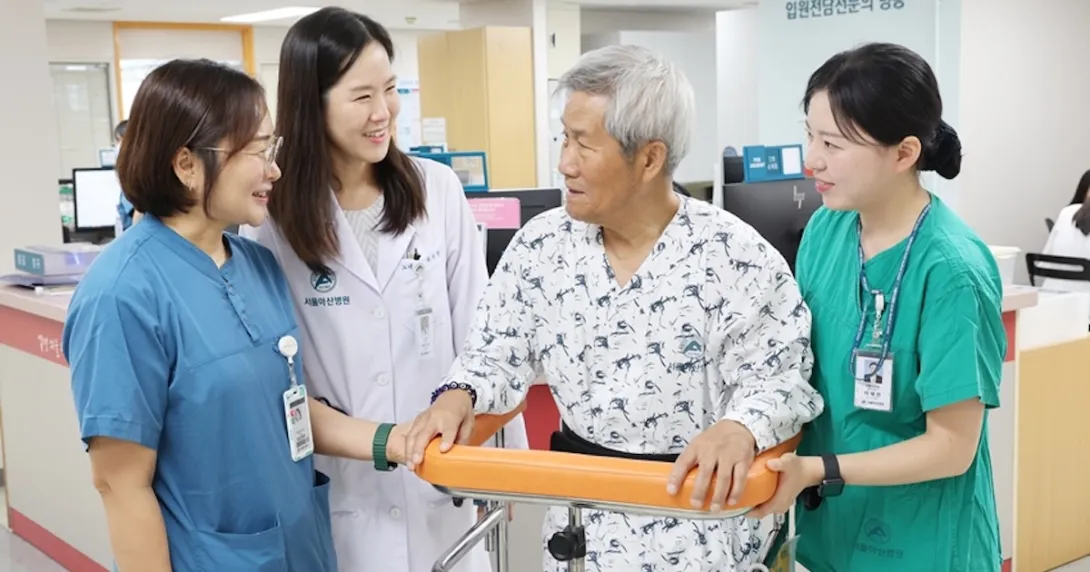
Photo courtesy of Asan Medical Center
Asan Medical Center has introduced an advanced version of its elderly frailty score, which can now predict more risks associated with hospitalisation.
HOW IT WORKS
The Acure Geriatric Risk Scale builds on the earlier Clinical Frailty Scale, which focused only on mobility, by incorporating clinical data to better predict major risks in hospitalised elderly patients, including delirium, falls, pressure ulcers, and in-hospital death.
Developed by AMC geriatric specialists, the quantitative assessment is done at the time of admission.
It assesses five indicators identified as the strongest risk predictors: clinical frailty score (mobility), serum albumin level (nutrition and immune function), CRP level (inflammatory response), haemoglobin (anaemia status), and the number of medications taken prior to hospitalisation.
Interestingly, the system further subdivides risk scores within groups of the same frailty rating.
The scoring system was developed by analysing clinical data of approximately 21,757 AMC patients aged 65 and older using machine learning and examining 18 variables from the hospital EMR system.
FINDINGS
AMC researchers validated the new scoring system's predictive performance against age and the previous Clinical Frailty Scale.
In a study, which findings have been published in the Journal of the American Medical Directors Association, the scoring system predicted risk factors in hospitalised elderly patients with 83.7% accuracy, outperforming the frailty scale (79.8%) and age-based prediction (63%).
Additionally, it found that higher risk scores were associated with a greater likelihood of other risks occurring, such as readmission within 30 days after discharge, revisiting the emergency room, extending the length of hospital stay, and calling the rapid response team.
WHY IT MATTERS
AMC reported that elderly patients make up four in 10 of its inpatients, a figure rising by 1.5% each year, with many presenting with severe illnesses.
The hospital has integrated the new acute geriatric risk scoring system into AMIS, its medical information system, allowing staff in each department to review an elderly patient's score and customise their treatment plans accordingly.
"It's difficult to identify high-risk elderly patients based solely on their medical history and age," emphasised Professor Lee Eun-ju of AMC Department of Geriatrics.
"The Acute Geriatric Risk Scale breaks down the potential risks for elderly patients, enabling a more precise assessment. This allows medical professionals to quickly identify patients requiring intensive care and provide appropriate treatment," explained the professor, who co-developed the tool.
Professor Baek Ji-yeon, who co-developed the scoring tool and is also from the AMC Department of Geriatrics, said the scoring system can be "immediately applied in clinical settings without the need for complex tests or equipment."
By identifying high-risk senior patients and accurately assessing their prognosis and potential deterioration, the acute risk scoring system is expected to "significantly contribute to improving patient intensive care and treatment outcomes."
The acute geriatric risk scoring is part of AMC's WithOne integrated care system for the elderly. It has a multidisciplinary team working "with" each individual (one) patient to provide comprehensive, personalised care from admission to discharge.
THE LARGER TREND
Alongside this effort to identify acute risks in elderly patients, AMC also aims to predict the early onset of Parkinson's disease from brain scans. Its researchers have built a generative AI model that autonomously learns from and analyses brain scans to diagnose the disease and predict its progression.
Across Asia-Pacific, projects are addressing the care needs of their superageing populations. In Australia, for example, a new mobile exercise application has been proven effective in helping older Australians prevent fall-related injuries. Fujifilm and Juntendo Hospital in Japan have also developed an AI that can predict an older patient's fall risk using their clinical data.
Digitally-enabled integrated systems for the elderly, such as AMC's WithOne, are also being set up across Thailand and Singapore. Besides remotely tracking falls, these systems can also assess their cognitive status and depression risk.
